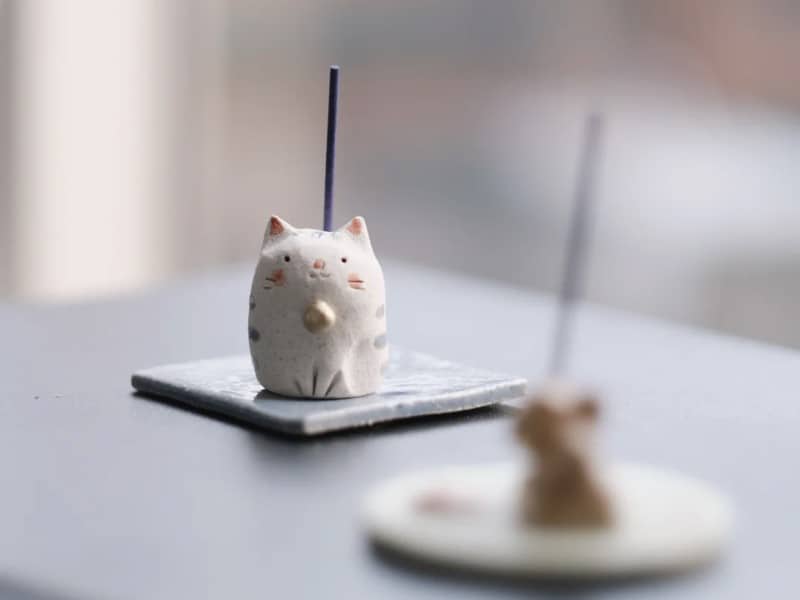Burning incense is one of the ways we find tranquility in our homes. The sweet-smelling fragrances and aroma arouse the good senses with relaxation. But the same cannot be said for pets, including dogs, cats, reptiles, rabbits, hamsters, and birds.
Burning incense is not safe for most pets. For one, pets are affected by the smoke if inhaled. Plus, they have different physiological reactions because their bodies are not well adapted to handle the incense.
Let’s look at some of the reasons incense could be unsafe for your pets at home.

Why is Incense Unsafe for Your Pets?
Ironically, at times we burn incense to deal with pet odors only to find out they could harm them as well. Even though some oil diffusers produce appealing fragrances, they can infuriate breathing issues in your pet.
So if your pet has some pre-existing respiratory problems, it could potentially be aggravated by oil diffusers. That said, you could find a way around this, and we will see how you can still use the essential oils and oil diffusers without harming your pet.
One way is to keep them out of reach of your pet. Most pets are pretty smart and can easily retrieve them from easy-to-find places. In addition, you need to keep your windows open with proper ventilation.
Essential oils are known to be harmful to cats. Besides causing irritations, they may cause critical physiological problems such as liver failure. Cats’ digestion systems lack enzymes responsible for breaking down essential oils.
Since they are not appropriately absorbed in the cat’s body, this can cause severe problems in your cat, irrespective of the absorptions method (Ingestion or skin).
There are about three main reasons why you should avoid burning incense if you have pets at home.
Smoke Inhalation Problems
Incense burning is regarded as a source of particulate emissions in your home through incensed smoke. Now, these particles travel to the pet’s respiratory tract, which is harmful, especially if they have harmful contaminants.
Therefore, your pet is at risk of conditions prevalent in humans as well, such as airborne dermatitis or mutagenic effects. Their smaller lung sizes magnify the impact of the contaminant on cats. In other instances, your cat could be affected by sneezing problems.
Smell Sensitivity
Usually, animals tend to have a heightened sense of smell. Essentially, pets have better senses than humans do. For example, a cat is said to have 200 million smell receptors in its noses. By contrast, humans only have a fraction of that, which is about five million. Again, animals’ senses are on steroids.
With that in mind, it is easy to see how pets receive a simple aroma. While humans perceive essential oils as sweet-smelling fragrances, pet receptors pick up strong smells. Even though the strong odors may not cause serious health problems, it does irritate your pets.
Fire Risks
Since you burn incense, the risk of fire, especially in the open flame, cannot be ignored. The risk of fire is minor, but that doesn’t mean you shouldn’t check it. Occasionally, pets, particularly young ones, could swipe at a fire out of curiosity. If that happens, she might burn her paws. As such, open flames and curious pets are a terrible combination.
Burning incense takes place in a holder while it is placed as sticks. When a pet strikes the stick, it may cause a fire if the incense touches a flammable item. And even a candle is not the safest because a pet can easily knock it down.
Effects of Incense on Pets
According to the Environmental Protection Agency (EPA) research through a 2001 report, smoke causes particulate emissions. The resulting particles can attach themselves to the respiratory tract. As we had seen earlier, the particles cause airborne dermatitis and mutagenic effects.
Essentially, your pet lungs get inflammation and air passages leading to less oxygen in the pet’s system. The problem is aggravated by the fact that pets have smaller lungs as compared to humans.
Dog
Brachycephalic breeds such as Terriers, Pugs, and Bulldogs find it harder to breathe when they contact incense smoke. One of the reasons they behave as such is that they have short noses and muzzles. In a way, there are breathing restrictions, which are alleviated by incense.
Other dog breeds face a similar fate because of smoke inhalation. In worse-case scenarios, the smoke wakes asthma in your pet or even acquires the disorder generally caused by allergic reactions. Asthma is responsible for air passages inflammation which causes severe breathing problems.
Cats
Incense such as Camelia, Sandalwood, and Camphor can cause allergic reactions in cats. For example, cats will react to incense by eyes swelling, sneezing, and breathing problems. Breathing issues are caused by inflammation of the respiratory tract.
If you notice the following symptoms in your cat:
- Abnormally restless
- Apprehensive
- Indifferent
- Unnecessary running
Your cat might have a health problem related to incense. They may also portray Loss of appetite coupled with vomiting and diarrhea.
Birds
Bird pets are affected by incense just as dogs or cats are. For instance, your parrot has a problem with the essential oils since they can pass through its lungs. In essence, they have quite sensitive lungs which can’t handle the sweet-smelling aroma from fragrant candles.
A parrot’s respiratory system is so delicate that it can quickly die from inhaling incense or fumes. Some of the signs to observe include signs of trembling or shaking.
Additionally, if the pet parrot cannot perch, it could be she has a breathing problem. A vet uses a device known as a bronchodilator.
Most of the effects of incense on cats, dogs, and birds will also affect rabbits and hamsters because of the similar body functionalities as vertebrates. The best thing you can do is to protect your pet against risks from incense.
Safety Tips for Using Incense Around Pets
When you have no alternatives but to use incense within your home, there are few things you can do to make it easier for your pet.
Keep the incense far from the pets
Cats will quickly smell out any strong aroma. Because of their inquisitive nature, they could try to reach out to get the incense. Ideally, it would be best if you kept them locked in a room where your feline friend doesn’t have access.
Keep your home ventilated
This one needs no explaining, but it’s good to know that the particles produced in the smoke can deposit in a pet’s lungs, causing problems highlighted earlier. Always ensure that the house is well ventilated before burning incense.
Use high-quality incense
In most cases, high-quality incense supersedes low-quality ones. The low-quality stuff will release unhealthy particles into the air. The significant difference between the two scents is that one is traditional while the other is dipped in incense.
As the name implies, traditional incense is made through ancient recipes that usually combine ingredients into powder form. Further, the powder is mixed with honey to form dough rolled on a bamboo stick.
The rigorous process means that traditional incense is costlier than dipped incense.
By contrast, dipped incense is a low-cost alternative that’s mass-produced. Instead of a bamboo stick, this version uses charcoal or sawdust. In some instances, the bars used are sometimes treated with chemicals.
Due to the changes that occur, the quality of the burn isn’t as good as in traditional incense.
Final Thoughts
Generally, burning incense is unsafe for most of your pets. Pets receptors are different from humans. It is a more pungent smell for pets because of the hundreds of millions of receptors they got.
That said, there are alternatives you can try out, such as air purifiers or fresheners. Alternatively, you may create an environment that will allow the use of incense without harming your pets. One way to do so is to keep the scents far from pets, especially cats. Plus, using high-quality fragrances for nonharmful burns and smokes.
Read more:
